Interview 048 • Jul 13th 2016
- Interview and Portraits of Daniels by Lou Noble
Links
Foreword
In a sea of greenlit reboots and fodder fraught with recycled ideas, inspired works tend to stand out. Enter Daniel Kwan and Daniel Scheinert, a pair of directors known collaboratively as 'Daniels'. We've followed their work for a few years, marveling at their quirky storytelling and visual effects ingenuity, jumped at the chance to talk with them about their new feature-length film 'Swiss Army Man', starring Daniel Radcliffe, Paul Dano, and Mary Elizabeth Winstead.
We sat down with the pair (and some special guests) at the cafe bar at ArcLight Cinemas in Los Angeles.
This interview has been edited for clarity and content.
Interview
Did you guys think about who would watch the movie? Was there a particular audience you were making it for?
Daniel Scheinert: Yeah…yeah! Yes and no. We thought a lot about who would watch it, and, if anything, spent a long time trying to constantly prevent it from being too niche. Once we came up with the premise and were making the movie, there was no going back. The movie starts the way it starts…it was weird to its core, so then we spent a long time trying to make it as accessibly weird and palatably weird as we could, because we wanted people from middle America to see it, specifically we wanted people like us to love it, and then people like our moms to get it and like it.
Daniel Kwan: I think, deep down, I’m a people pleaser, and, in general, when we’re making things, I want people to like them. But then, the other half of me…it’s so insincere and uninteresting to just crowdplease, and so if we start off in this really hard/weird/strange/obtuse place, then I can put all my energy into people pleasing.
Daniel S: It’ll come naturally!
Daniel K: It’ll become this weird amalgamation of our tastes.

Daniel Radcliffe and Daniel Kwan on the set of Swiss Army Man
My impression is that you guys are incredibly earnest, sincere and tender, and you cover that in a cookie & candy coating of strange and transgressive, almost as a way of getting people to watch. That the weird stuff is what draws people in, but the real story is about “a guy finding himself” or “two people figuring out who they are.”
Daniel K: I think you nailed it on the head. We liken it to a trojan horse, where we sneak past people’s expectations and kind of, ideally, give them a really sincere, beautiful experience. Because…that’s why we go watch movies, we want to be moved, reminded of our humanity. Too often when people go off and make movies with that goal, it comes off sappy and cliché, saccharine. I feel like, deep down, we love that stuff, but the other half of us is really self-aware of the fact that all that stuff is overdone, and it’s more enjoyable to make fun of that stuff. So we’re kind of having our cake and eating it, too.
We’re making fun of the earnestness that movies can have, but at the same time we’re hoping that people can feel it, too. It’s a really weird…it’s a problem we have, nowadays, because everyone is so…it’s very postmodern, everything is done ironically, and I think, in some ways, because we start from there and then push towards something true and sincere, it feels more honest (for us), today, and certain audiences can relate to that, the ones who really dig this film and get it on their first viewing are the ones who, I think, have a similar world view as us. It’s been kind of fun seeing those people get to watch this movie and get drawn to its strange balance of sincerity and insanity.
Daniel S: I feel like a lot of really weird artists are really sincere, heartfelt people. Tim & Eric, or Kurt Vonnegut or…
Daniel K: David Lynch
Daniel S: David Lynch, he’s super sincere, super into meditation and personal growth and therapy, and then the people who make movies that are super heart-on-their-sleeves sincere, or straight-forward happy ending whatever, are jaded, cynical pieces of shit, like Michael Bay, Bryan Singer, Roland Emmerich, I feel like these super-rich, jaded cynical people who make the sweet movies, and then all these sweet people make the crazy ones, because they’re trying to make something honest…it’s an interesting dichotomy.
I’ve never met any of those people I just shit-talked…I just love to shit-talk.
How does it feel to be up against Independence Day 2?
Daniel K: It’s so fun!
Do you guys think you have a chance against ‘em?
Daniel K: Oh yeah, for sure. We’ve known the schedule for a very long time, so we’ve been coming up with all sorts of slander campaigns against Independence Day.
Hahahahhaha
Daniel S: We keep being like, “Hey, have you heard what Will Smith’s next movie is? NOT INDEPENDENCE DAY 2!” It’s weird, because we’re up against Steven Spielberg next week, too!”

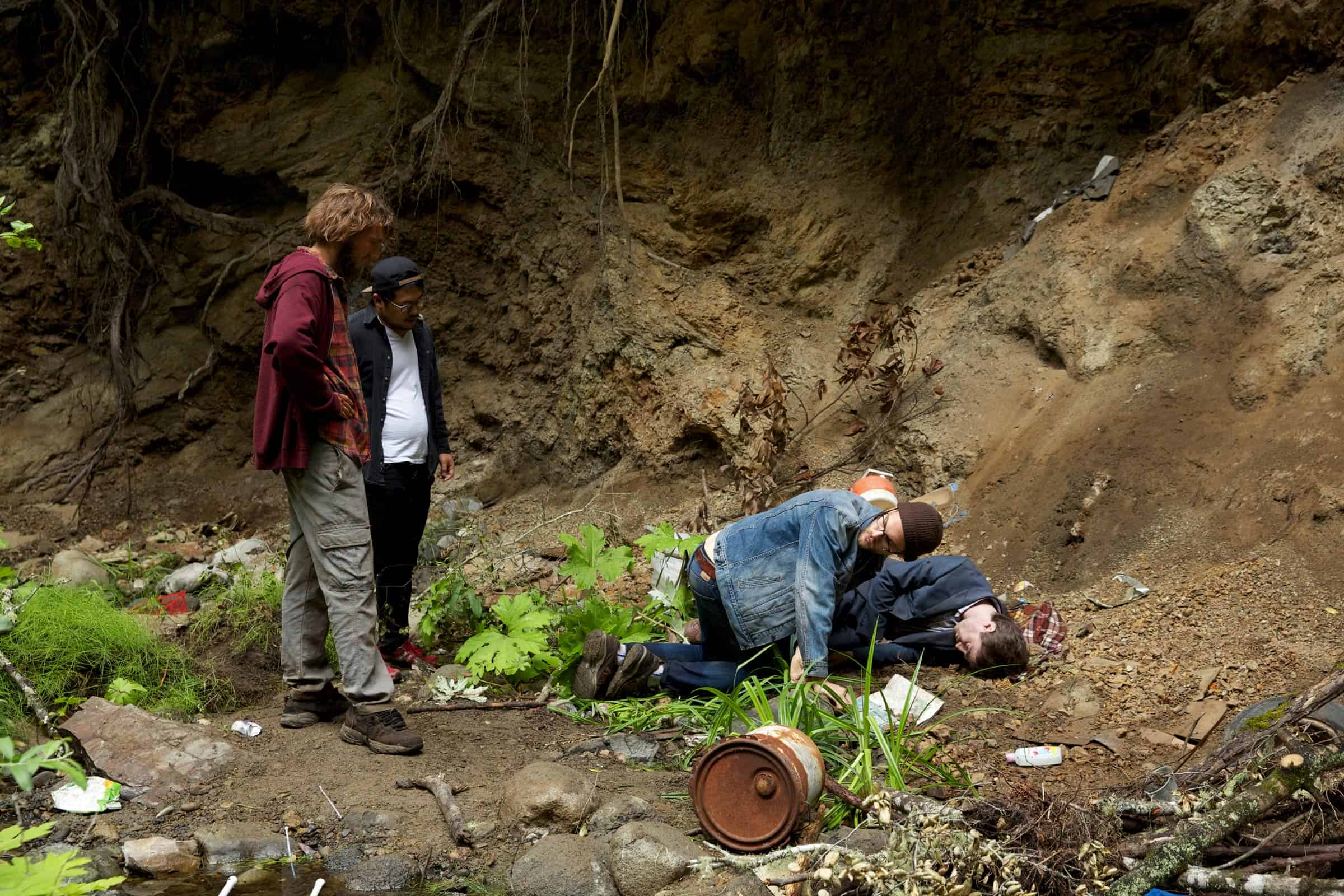

Paul Dano, Daniel Kwan, Daniel Scheinert and Daniel Radcliffe on the set of Swiss Army Man
Are you guys…I’ve noticed you use a lot of practical effects. Is that something you two are tied to?
Daniel K: Oh for sure. It’s just a more organic way to create. You can react on set, you can actually see it happening in real time, actors get something to play off of, they’re not just running from tennis balls. It’s a lot more fun, it feels a lot more natural, and a lot of our work tries to be grounded, despite the fact it’s insane, so if we did CG stuff, it would just feel wrong and inauthentic, and I think, selfishly, it makes shooting a lot more fun, when we can throw stuff in the air and break things, if we ever did a fully CG movie, I think we’d do it as a joke.
Daniel S: Well that’d be fun! Like an animated film!
Daniel K: Yeah yeah, that!
Daniel S: I feel like CG’s great when you’re trying to create things that don’t exist, but when you’re trying to create something that’s relatable to the real world, the trial and error in practical effects keeps you humble as a filmmaker, “oh, I guess cars…don’t do that! We have to rethink this scene!” It’s almost like we’re doing Mythbusters at the same time as making our movie, we’re testing out how, say, wood leaves fall. And then we can augment it in post, but we have something real there.
Daniel K: And also, we never have the money for CG, so it also just naturally happens. I think we like to be very resourceful, changes the way we make things, depending on what we have around us, so…
Daniel S: I feel like a lot of people think practical is more expensive, but if you’re smart about it, it’s not!
Daniel K: Yeah. We once did a commercial, and the reason they went with us is, we said, “we’re not going to do any CG, it’s gonna be dancing teddy bears, dancing to dubstep in a cereal commercial.” They didn’t have enough money for CG, so they offered it to us, we did it all practically, we shot with these big, eight-foot-tall teddy bear costumes, with break dancers inside of them, against a green screen. We put it out, it was great, did really well, and then someone from a big animation studio hit us up and said, “oh my god, I loved that thing you guys did!” And we sat down with them and they said, “so, tell me about animating those bears.”
“Oh…there was no animation.”
Daniel S: And then she laughed, “Ha ha ha, no, but seriously, how’d you animate the bears?” And we had to pull up the BTS to prove to her that they weren’t fake, because it really confused her. And then it became, “well, why are we in this meeting?”
Daniel K: Yeah, it’s a really weird thing, in that, if you’re smart about it, it can be a lot cheaper and a lot more fun. We got to build these teddy bear suits and have break dancers run around and jump on trampolines and it was so much more fun. There was a little girl actress there who got to watch that happen, and it was so much more fun for her, too. And I think that’s kind of why we make movies, so we can collaborate and have fun and make sure that we always have a good time while we’re doing this, because it’s such a strange, stressful job that takes way too much time from your life, you may as well have a good time while you’re doing it.
So that’s why no CG!
Daniel S: Because life is short and we’re all going to die…and it’s more fun.
That’s the meat, right there! Most of our readers are really about death, so…! Do you two have a set of visual rules for your work? Constraints?
Daniel S: I think we get a kick out of every movie having a “box” that we’re playing in, otherwise, if anything goes it’s hard to make a decision. We’re not the kind of directors who just think of a scene and know exactly how to shoot it, but…at least, our stories, we can pick them apart, create some rules that are going to serve it and then that’s going to give us a driving force with our imagery, where we can say, “oh, okay, the rules here are ______.”
Daniel K: Yeah, and, more often than not, and this is definitely the case with Swiss Army Man, what we’re trying to do is wrap up our strange ideas in an aesthetically beautiful and compelling way, so that people almost can’t deny it, even if, logically, they’re thinking, “this is so dumb.” The goal is for us to draw them in with beauty, so we shot this film anamorphic, and we shot it with natural light, and we color-corrected it so that it felt like a much bigger budget movie than it was. I think part of the fun cognitive dissonance of the film is that it exists, but that it also exists to the scale, and part of the reason why we aesthetically shot the film the way we did is because we wanted it to feel unreal, so beautiful and bold and, honestly, looks expensive, when and idea like this should never get that kind of budget. We just like that almost meta-narrative of execution of the idea.
It feels like the color palette gets warmer and more vibrant as you guys go along in the film.
Daniel K: Yeah, definitely.
Daniel S: Yeah…I guess so!
And then it kind of cools off near the end.
Daniel S: Yeah…right, right!
Daniel K: It’s an interesting thing where, just narratively, the dead body doesn’t produce fire until they actually have a close connection, and so for most of the film it is lots of cold cold nights and green green forests, but once they start building things, and once their relationship comes together through the trash and the fire and all the other things that bring in that warmth, that fire, it kind of naturally happens, without a master plan. But then, by the end, we did want to definitely make sure the last bit just felt “real” again, we dropped out all the color, we wanted it to feel like a cold shower, “oh man, we had so much fun with all this weird shit, but now we have to deal with the consequences of what we’ve done”, you know?



Paul Dano and Daniel Radcliffe behind the scenes of Swiss Army Man
One thing that also struck me, because I went through the whole film thinking, “okay, how do you explain it?” And I think it was brave to not do that, to not do a “but This is what was really happening!” You two kept going…was upending the convention of movie endings something you two were conscious of building?
Daniel S: A lot of times we said the story told it self. We came up with the basic plot and then just kept trying…we tried everything. It wasn’t like we decided for some academic reason not to explain it, it just was like…every time we tried to explain it, it just wasn’t good.
Daniel K: The magic was gone.
Daniel S: The magic was gone. So we said, “I guess we can’t explain it, because the movie’s bad, then!” There was no explanation that made it good…
Daniel K: Apparently, there’s a draft of Groundhog’s Day where they explain what happens to him.
That ruins it.
Daniel K: Exactly, so they cut it out, in the script, and it makes the movie really great.
Daniel S: It’s like Donnie Darko, versus Donnie Darko: The Director’s Cut, where it goes into the time travel and stuff, and you’re thinking, “no no no, stop! I don’t care!”
Daniel K: And one of the things I was reading about them making the decision to cut out that scene, I think it was some sort of gypsy casts a spell on him…
It’s always gypsies.
Daniel K: I know! Would’ve ruined the movie. The way that they justified it to themselves was, as long as it makes emotional sense, the fact that he gets what he deserves was enough for people to go along with it, like, “this guy is an asshole, he deserves to live his life over and over again until he learns what’s right, how to be a decent human being.” I think that just became how we tried to deal with this story, whatever felt emotionally right at the time, because every time we tried to explain it too much, it would just derail the film, or you get hung up on the parts that aren’t important.
Daniel S: We wanted it to be emotionally relatable, not just for some personal, “we wrote it in a journal, it makes sense” way. We spent a long time trying to track how the audience will react, will they emotionally track with it, because no one cares about logic until after you leave the theater and one of your friends starts poking holes, or some youtube guy makes “everything wrong with _____”.
Daniel K: Fridge logic.
Daniel S: Fridge logic?
Daniel K: Yeah, it’s the stuff that you think about when the movie’s done, and you’re sitting at your fridge looking for food and you go, “wait, how did his life turn over and over again?”
How did Indiana Jones make it in that submarine all the way to the Nazi island?
Daniel K: Exactly.
Daniel S: And that doesn’t ruin a movie, unless it’s a huge hole, you know?
Those are the things you don’t want people to think of during the movie.
Daniel K: Right!
Daniel S: Right! And if they think of it, it means the emotional arc is fucked, because they’re thinking about the logic too much.
They’ve started to think…and stopped feeling!
Daniel S: Right.
You guys can use that, that’s all yours.
Daniel K: Hahahaha! You’ve done this before.
Oh, a few times. One thing we’ve had as a through-line with the last few people we’ve interviewed is the idea of a certain tension in their work, either thematically or different elements, and it’s brought up the discussion of good work all having a certain elemental tension. Work that’s pretty, on its own, without any kind of tension, is easy to ingest and move on from. But good/great work has a tension that requires the viewer to spend more time engaging with the work. Is that something you two think about?
Daniel S: So you mean aesthetic tension.
Aesthetic, or thematic…
Daniel S: Yeah.
Daniel K: I think that’s everything we do. Everything we do, subconsciously, we create contradictions, and we then spend however much time it takes for us to figure out why we’re excited about that contradiction. This film started because we love the idea of (and this is the headline that a lot of people are using, now) wanting to make a movie that started with a fart that made you laugh and ended with a fart that made you cry. And that was such a, if we’re gonna talk about a weird tension, that, tonally, that felt impossible to us. No one will ever be able to cry because of a fart, that sounds impossible!
That just felt like such a beautiful, strange challenge, the more we thought about it. The more we realized how much we didn’t want to do it, the more we had to do it, it had to be a thing that we at least tried, to see if we could pull it off. But in the process we ended up worrying a lot about what the film ultimately needed to be. It ended up becoming a movie about shame and things that keep us apart from each other.
But that only came about because of the tension you’re talking about. The two contrasting tones…
Daniel S: That inspired us. “Oh, that sounds like a fun challenge!”
Daniel K: Right.
Daniel S: I was just thinking, when I love watching a Quentin Tarantino movie, I’m invested in the characters, I’m really worried for them, and at the same time I’m invested in “what on earth is Quentin Tarantino going to do?” The fact that he sets up rules where anything can happen, where a scene can last anywhere from sixty seconds to thirty minutes, where they might just sit at that table, you don’t know! That when people take risks, it makes the movie twice as entertaining, to me. But then there’s a slippery slope where you can alway make a movie where all you’re thinking about is why the filmmaker made it. And you don’t care about the characters. We’re definitely going for that narrative tension, as well as that meta-narrative of aesthetic tension.
Because it seems that it’s an easy trap to fall into, where an entire movie is super-weird, where it’s all weird and you lose the emotional core. And from your work, I come away with the sense that you’re able to modulate that really well.
Daniel K: Thank you! We’re still figuring it out!
Daniel S: Yeah! We definitely wanted to shoot this movie in between blockbusters and Sundance movies, and it was fun to plop it into Sundance, and a lot of people went in thinking it would be a hard-hitting indie drama, you know?

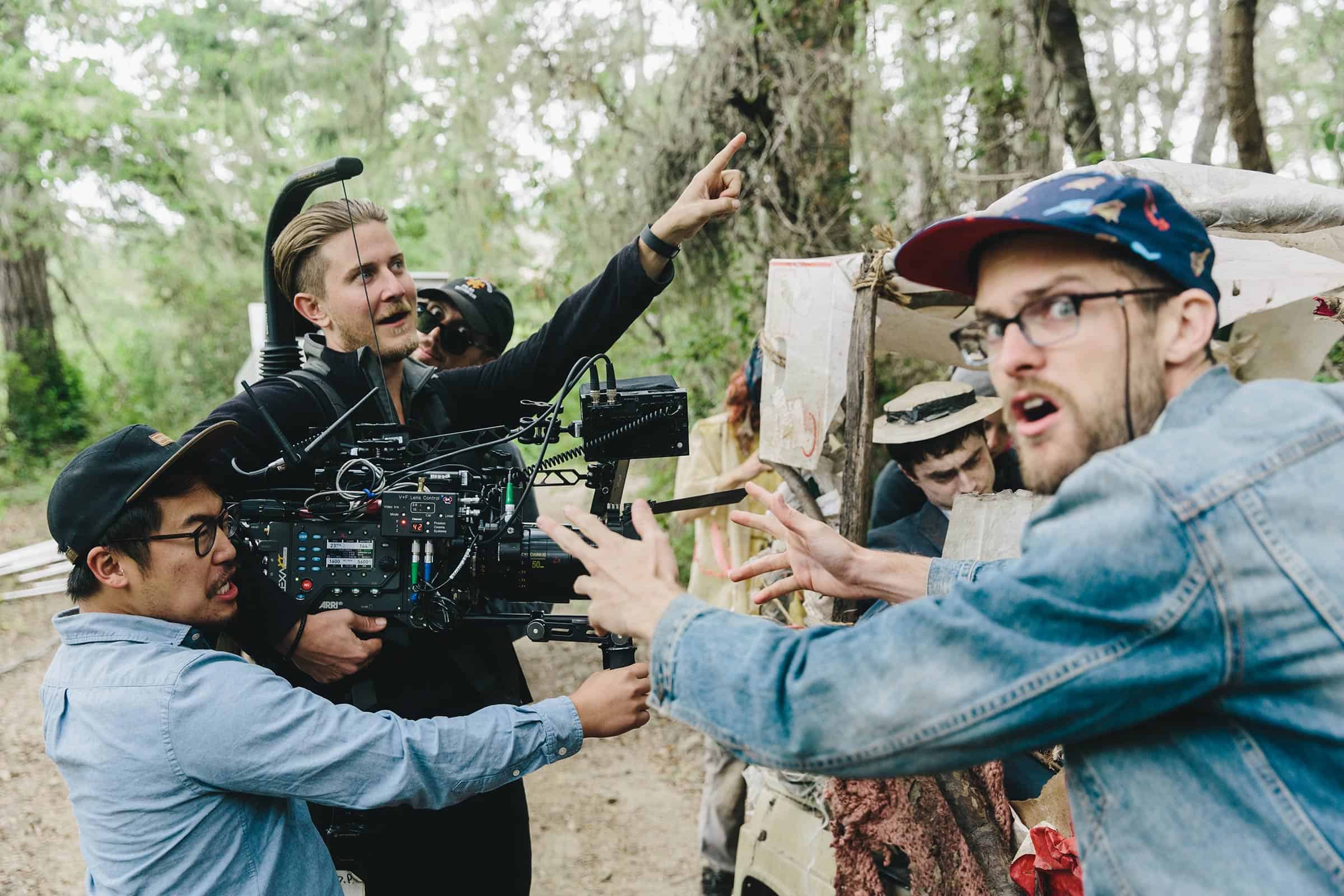

Daniel Kwan, Cinematographer Larkin Seiple and Daniel Scheinert on the set of Swiss Army Man
A serious piece about what happens to dead bodies, discarded by society.
Daniel S: Right! Or a purely artsy thing, like if it had just been farts, but kind of weird and Lynchian, I think people would’ve actually been less surprised, “oh yeah! An hour and a half of crazy!” The craziest thing was that it had broad sentimental action scenes and musical numbers.
Is that something you two played around with, once you had it back in the editing bay, “is it too funny here? Is it too serious there?”
Daniel S: Yeah. In the writing, the shooting and the editing, there was a constant struggle to find that tone, and not let it slip too far in one direction or the other, and figure out when it was worth challenging the audience.
Are there particular beats…you two have seen it with an audience, are there particular beats you waited for, to see how people react?
Daniel S: Yeah, one of the selfish reasons I like making comedies is because when you make a drama, you can’t tell if the audience likes it or not, until later when they tell you…and they might be lying.
Hahahhahaha
Daniel S: But people laughing is, “ah, they got it! They’re there, they’re with it!” So there are a few big moments where when the audience is into it, they laugh really hard. SPOILER ALERT: Like when Manny talks, when he first talks, some audiences react so loudly, and it’s so rewarding, because it means that they didn’t expect a joke to happen, they didn’t expect him to talk, they were so invested in this not-talking corpse movie, which is a good feeling.
Daniel K: I mean, the easy one is when the titles come up, it’s the image that people relate to this movie, the classic “man riding a dead body like a jet ski” image,
Classic. I think I first saw that in a Shakespeare play. It’s nice that you two go for the classics.
Daniel K: Yeah, there’s a long tradition of corpse as vehicle. I remember when we premiered it at Sundance, when that title slammed on, it was just so wonderful to hear the audience making all sorts of noises, not just laughter, some of them were screaming, groaning, cheering, crying, laughing, Daniel was crying.
Daniel S: You can’t really hear tears. But I felt them.
Daniel K: Exactly. It was such a different kind of moviegoing experience, knowing that half the audience could be really into this, half the audience could be completely confused, some of the people could be walking out the door. All at once, all in this one moment, and I think it’s really fun. And after that moment, I knew the screening was going to go really well. It was great.
And now, a question from Julia Vickerman, a mutual friend who saw the movie recently and loved it: Do you think, if people farted in front of each other, it would create a more intimate connection in society?
Daniel S: Farting in front of each other, farting in front of your friends and loved ones, I do think that for a lot of people…farting in the movie is a metaphor, but it’s also literally true that a few years into your relationship with your significant other, you start having to discuss bodily functions, there’s a line there, and some people never cross it, some people go ten years of marriage.
Kirsten (Daniel Kwan’s fiancé): It didn’t even take a couple years! It probably took a couple weeks.

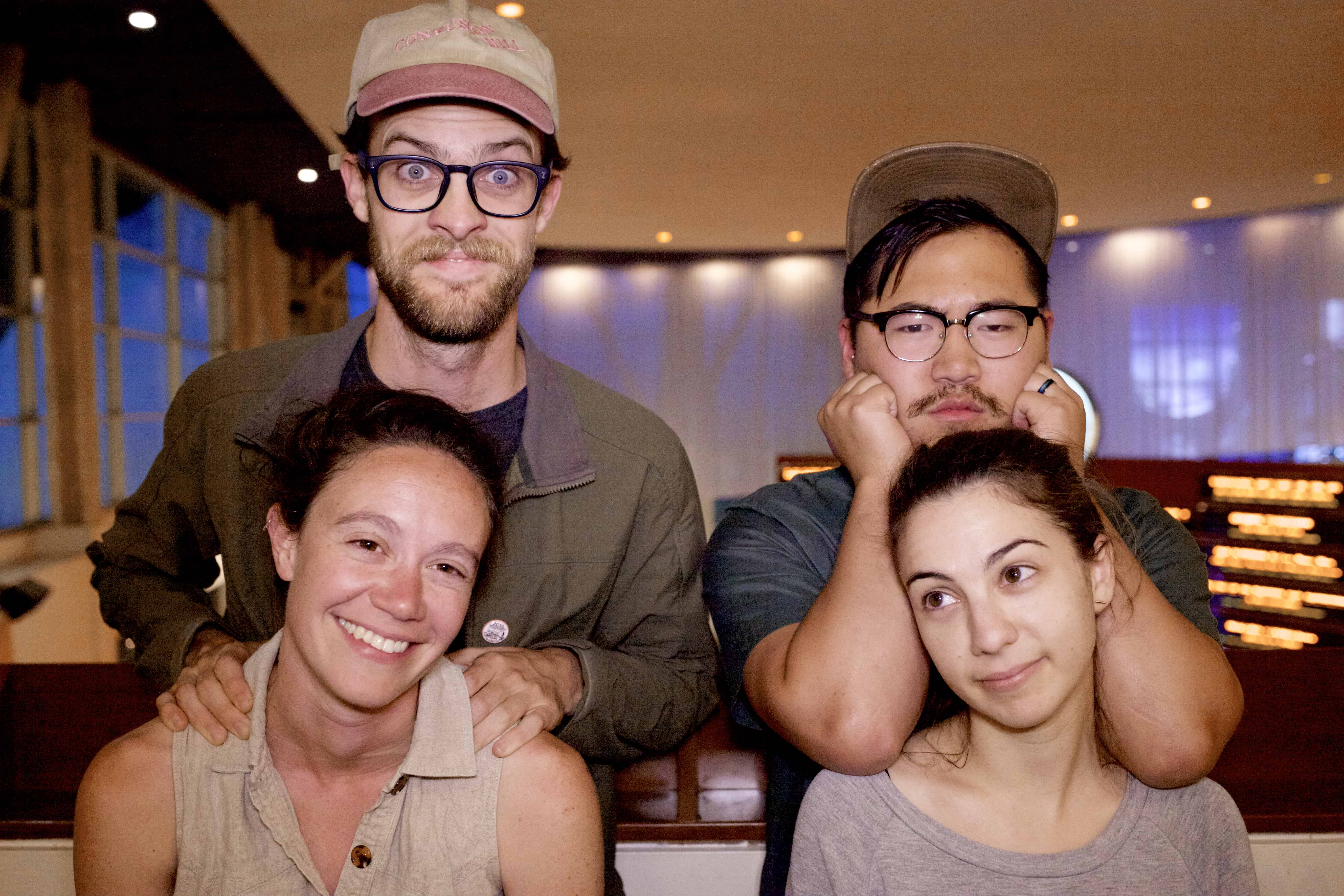

Daniel Scheinert, his girlfriend Stephanie, Daniel Kwan, and his fiancé Kirsten.
Daniel S: how long did it take you, Kirsten, to fart in front of Daniel?
Kirsten: Me, or how long did it take Daniel to fart in front of me?
Daniel S: Both!
Stephanie (Daniel Scheinert’s girlfriend): Because that’s a very different…
Who farted second?
Kirsten: I farted second!
How long did it take you?
Kirsten: It probably took me…six months.
Daniel S: Wow.
Kirsten: It probably took him a week, and he was on top of me and farted. And…MANY people have done this to me before.
Daniel S: You know, I’ve been tempted, sometimes, to fart on you.
Kirsten: People like to just roll onto me and fart, and I just feel it vibrate throughout my whole body.
Stephanie: And does that bring you closer to them?
Kirsten: I think it’s funny! It does! I actually think it does.
Stephanie: Is that reserved for your special friends?
Kirsten: It’s very special. I think if someone farts in front of me, it really does show me that they feel close and comfortable and I think it’s a good thing, I really do.
I want you all to know: this WILL make it into the interview.
ALL LAUGH
Daniel S: Great! Now it’s time for my girlfriend of ten years…
Stephanie: I don’t remember when we first farted!
Daniel S: Me neither! I think it was…I think one of the reasons we bonded was that we were pretty comfortable with that.
It wasn’t even a monumental thing, you just did it.
Daniel S: I guess so!
Stephanie: I really don’t remember, yeah.
Daniel S: The thing I do remember, that’s kind of a similar threshold, is that I told Stephanie that my biggest pet peeve was being spit on, and she was laughing about how that’s kind of silly…
I mean, nobody likes it.
Daniel S: No one likes it, but we willfully kiss each other, and that’s spit.
Sure.
Daniel S: The difference is pretty…anyway, she spit a loogie right in my face, right then!
Stephanie: You gotta get over it! You gotta get closer together!

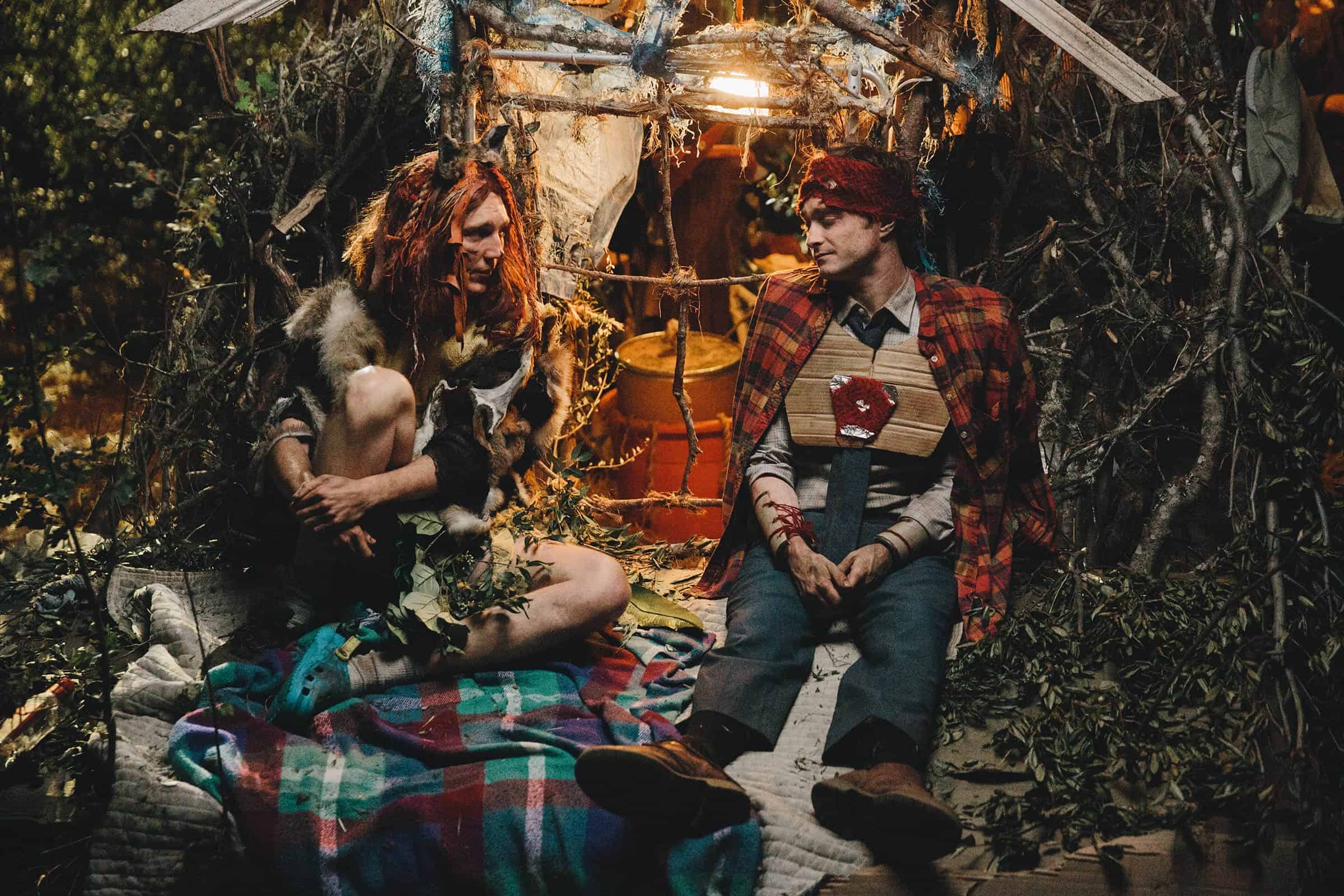

Paul Dano and Daniel Radcliffe behind the scenes of Swiss Army Man
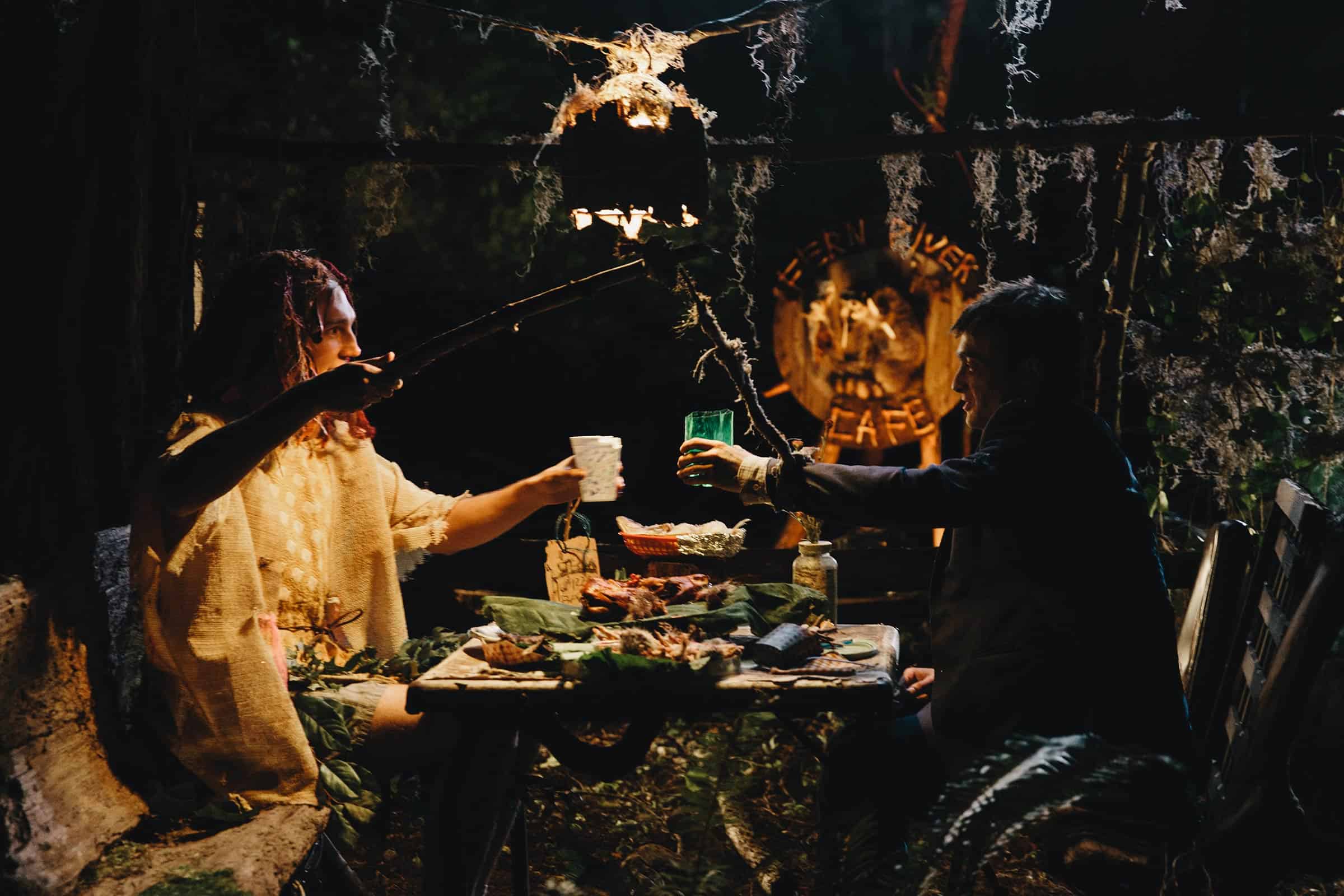

Right!
Daniel S: And I pushed her away, but then pulled her closer, ultimately. In that moment it was, “I hate you/I love you.”
Daniel K: Which is what our movie does to people!
Kirsten: It spits a loogie in your face.
Daniel S: Yeah! It spits a loogie in your face, and you’re like, “NO, I HATE LOOGIES.” And then an hour later…
Daniel K: Yeah, an hour after, you’re driving home from the theater and you think, “wait, you know what, I’m still thinking about that loogie.”
Daniel S: Yeah, “why was I so scared of loogies?”
Stephanie: “That loogie made me cry.”
First a loogie makes you laugh…
Stephanie: …then a loogie makes you cry.
Daniel K: That’s our sequel!
Daniel S: It’s called “Stephanie Lynch”. It’s just the story of my girlfriend! Biopic.
Daniel K: The funny thing is, we do have this really…the story is almost too fitting, too perfect, it’s almost like we made it up. After the second screening at Sundance, we finished the Q&A and then this middle-aged lady ran up onto the stage, and she said, “I know I’m not supposed to be here, but I just need to tell you that I have a friend who can fart in front of me, and I have another friend who can’t fart in front of me. And I just know if that friend could fart in front of me, they’d be so much happier.” And then she started bawling, and Paul Dano had to come and hug her, and we all just stood there thinking, “is this really happening?”
Daniel S: Yeah, I had to ask our producer, “wait, what did she say?”
Was she Sad Crying, or Emotionally Relieved Crying?
Daniel S: No, she was sad crying, because her friend wasn’t there, her friend wasn’t “fixed”, I think the movie illustrated her friend’s sadness to her.
Daniel K: Suddenly it made sense to her. We gave her a weird metaphor to relate to her life, and it was kind of great. And maybe that answers Julia’s question a little bit, too.
Did you two have visual inspirations for the film?
Daniel K: Yeah, we spent three or four years collecting images, we have a massive folder of pictures, and some of them aren’t relevant, but most of them ended up becoming, subconsciously, part of what we were trying to do.
Daniel S: We actually got really frustrated with the screenwriting process, we’re must more used to making treatments for commercials and music videos, so we just made a big treatment. We’d send out our script and people would say things like, “eeeehhhh.” But we’d send the treatment as well, which would get a, “but the treatment’s cool, though!” It helped ease people into how hard it was to read this on paper. And then it evolved, too, and it was super-valuable with our crew, we could just pass it off, “here’s a bunch of images, artwork we love that was made out of sticks, or leaves, here’s a bunch of images of people in the forest, with color palettes that we find to be really evocative.” And then, the thing that wasn’t in the treatment was also a collection of movies that we felt were tonally interesting, and we’d encourage different people in different departments to watch them, the actors watched certain movies, we made Daniel Radcliffe watch the scene from Bambi, where Bambi’s trying to walk on the ice, there’s this wonderful physical comedy! We made him watch Hot Rod, there’s a scene in Hot Rod where Andy Samberg falls down a hill for five or six minutes that’s soooo good.
Daniel K: It’s just the longest fall in cinematic history.
Daniel S: But it’s beautifully photographed, the whole film is beautifully photographed and sooo stupid. So we made them both watch that. And I’m not sure if I ever made anybody watch Marwencol, it’s a documentary about a man with brain damage who builds little figurines of World War II soldiers, and he lives out his life with Barbie dolls in his backyard, it’s incredible, I think our production designer finally saw that, Larkin saw it, our Director of Photography. But yeah, there’s a constant conversation about movies, ET we watched a bunch.

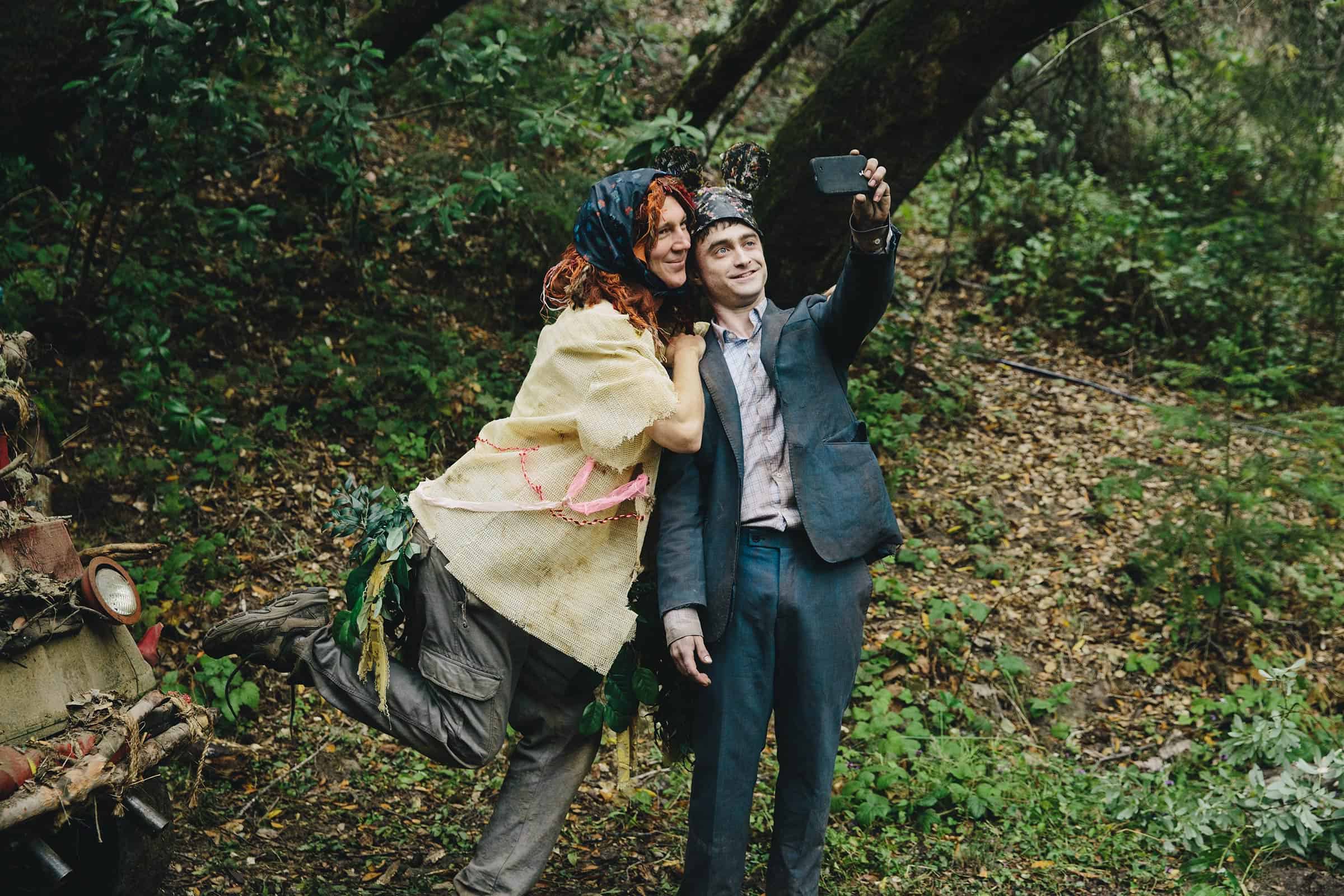

Paul Dano and Daniel Radcliffe behind the scenes of Swiss Army Man
Brazil?
Daniel S: I love Brazil, I haven’t rewatched it in awhile, yeah.
I thought about Brazil as I was putting these questions together…the phrase that came to me was “salvation through psychosis.”
Daniel K: Ahhh, yeah!
Daniel S: Right! I think we aimed to do a more optimistic Brazil. But yeah, societal pressure, ours is also a farce that involves psychosis. Society as an oppressive force, and love…
Yours is perhaps a little more uplifting…or A LOT more uplifting…OR uplifting, in general, at all.
Daniel S: Yeah! Oh my god, Brazil…the first time I ever kissed Stephanie was after we watched Brazil! We stayed up all night, watched Brazil, the most depressive fucking movie ever, and then I was like, “yo, babe, wanna kiss?”
Stephanie: That is EXACTLY how he did it.
Daniel S: I wonder if there’s something in there that connects with our movie…sadness brings us together.
Do you guys crave that high level of difficulty?
Daniel K: Great question.
Daniel S: Yeah, yeah…this movie was really hard.
Because, from what I’ve seen, all of your work is very challenging to make.
Daniel S: Sometimes I feel like we fight more when the difficulty is lower…
Mmmmmm.
Daniel S: …like, why have a directing duo if you’re just gonna make a rom com, there’s not two-guys’ worth of work to do, and the difficulty forces us to divide and conquer, and compromise, and push ourselves, I think we do thrive on it.
Daniel K: It’s like having a common foe.
Daniel S: Yeah! You have a challenge to overcome, as opposed to just a story to wrap up in wrapping paper.
Daniel K: And another thing that we usually say is that we like to have a problem that is hard to solve, throughout the process, the writing, the pre-production, the shooting, the editing, we want to make sure that there’s always a challenge…
Daniel S: So that we don’t get bored.
Daniel K: So that our brains are always turned on. The fact that we made a movie about a farting corpse means we can’t be lazy, I think I’m such a lazy person, deep down, I’m an incredibly lazy person and unless there’s something driving me or pushing me or lighting a fire under my ass, I won’t be able to achieve anything, and I think…Kurt Vonnegut says, “we all jump off cliffs and build our wings on the way down.” That’s the only way I can make anything, do anything with my life, if I force myself to do it, so the challenge is that, but it also makes it so much more rewarding when you can actually come out the other side and say, “wow, we did something that probably shouldn’t have been possible”. Both narratively, but also production-wise, all of the stuff we do, we’re stretching our budgets to the limit in everything we do, all of the best stuff we do. And this film is no exception.

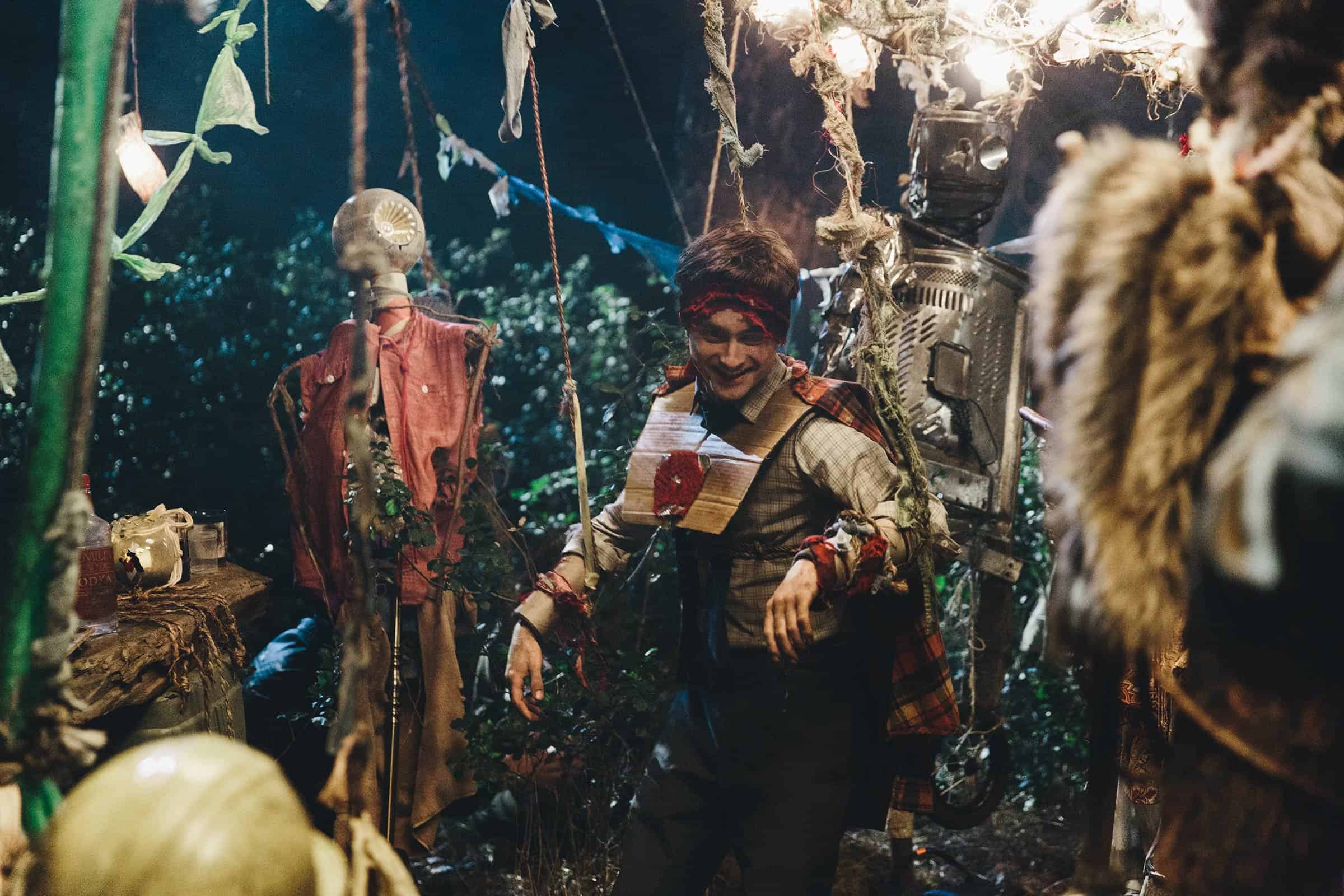

Paul Dano and Daniel Radcliffe behind the scenes of Swiss Army Man
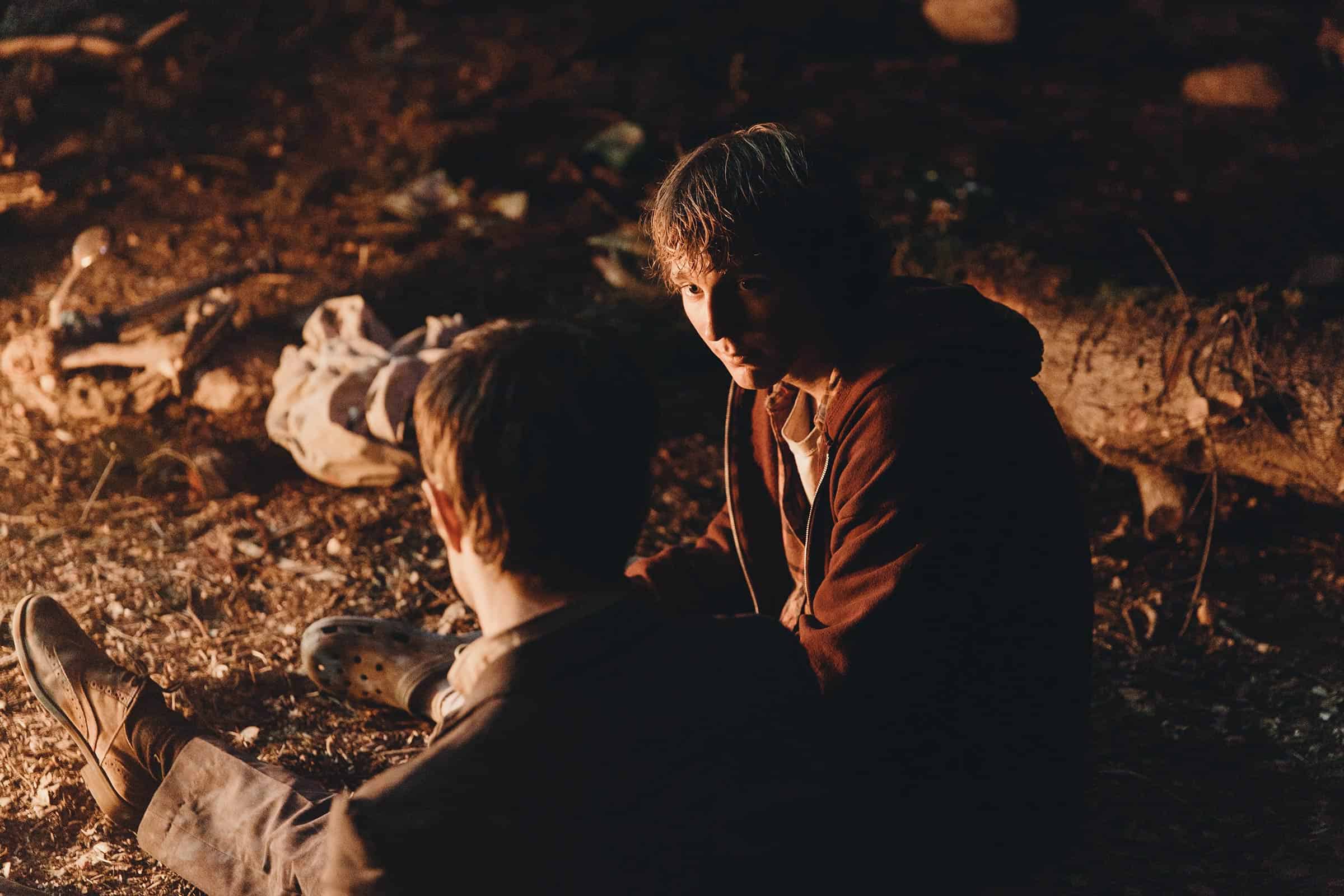

And finally, the question we ask of all our interviewees: do you prefer the process or the result?
Daniel K: I am such a results guy. I’m so shitty. My favorite thing is coming up with the ideas and then having it done. Mm. If I could do that all day, it’s great.
Just making it happen.
Daniel K: Yeah, yeah!
Daniel S: Maybe I’m the opposite.
Yes!
Daniel S: Sort of? I mean, there are parts of the process that drive me fucking crazy, but I make movies as an excuse to hang out with my friends and learn things and go places I want to go, so the process of scouting, with my friends…I don’t go out of my way to go visit redwood forests, even though they’re beautiful, but I made up an excuse to. Or, if I saw Daniel Radcliffe on the street, I would never say hello, but I got to say hello this time, because I was working with him! I got to get to know him, it was pretty dope!
Daniel K: “Hello, put this in your mouth.”
Daniel S: “Hello, fall down. Hello, does this hurt?”
Daniel K: Those are all things we got to say to Daniel Radcliffe on this shoot! So, that makes sense, you like that part, my favorite part is coming up with the idea, and then forcing it into the finishing touches, when it goes, “ah, it works!”
“Ahhhh!”
Daniel K: Yeah, that satisfying…where it all starts to sing. Everything else is…really hard.
Daniel S: Yeah.
Daniel K: If you want to talk about two guys with very different processes…yeah.
It’s why you two make good work!
Daniel S: I guess so!
Tension!
Daniel S (to Daniel K): Fuck you.
Daniel K: I love you.
Both: Oooooooohhhhhhhhh!


